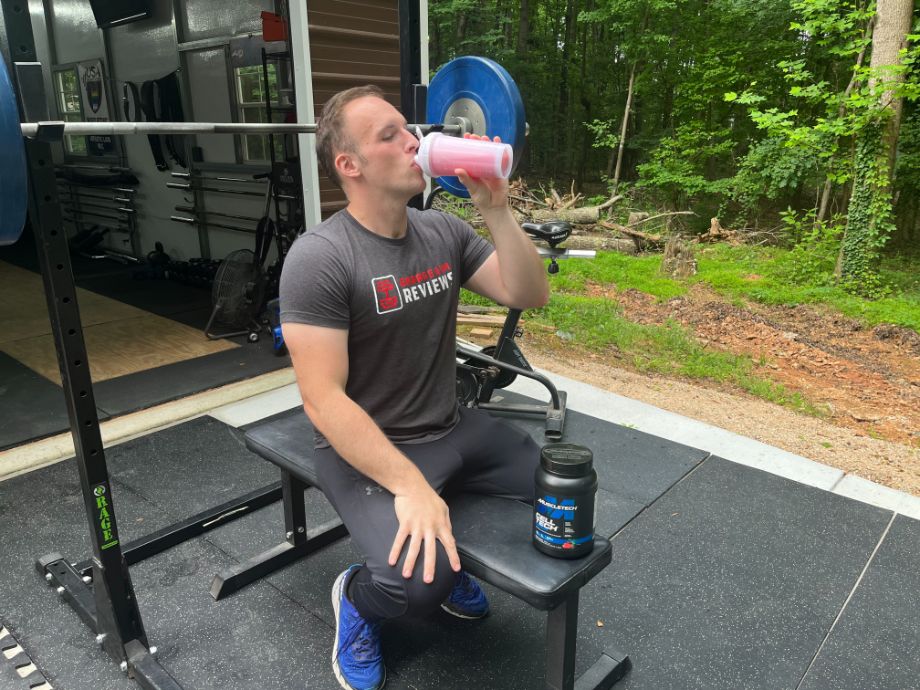We test and review fitness products based on an independent, multi-point methodology. If you use our links to purchase something, we may earn a commission. Read our disclosures.
If you’ve been eyeing creatine as a supplement to help you with building muscle, getting some extra reps in, or just to make the most of some high-intensity exercise, you’re not alone. Creatine is no longer a compound associated solely with bodybuilders—even the most casual weightlifters are benefiting from this easy-to-take dietary supplement.
RELATED: Best Creatine
That said, when are you supposed to take the stuff? Do you take creatine before or after workout? Creatine timing is something that’s been studied far less than creatine’s effects, but it is also something people are understandably curious about. So, let’s talk about whether you can get the most out of creatine’s purported muscle building, rep boosting, and recovery speeding benefits from timing it properly. Does it make a difference? Should you take creatine on rest days or with any other supplements? Let’s take a look at what the science says.
Medical disclaimer: This article is intended for educational and informational purposes only. It is not intended as a substitute for medical advice. For health advice, contact a licensed healthcare provider.
What Is Creatine?
In the body, creatine is synthesized naturally from various amino acids. Even though creatine is among the most popular supplements to take in the weightlifting community, people can also get this compound from animal foods such as red meat and seafood.
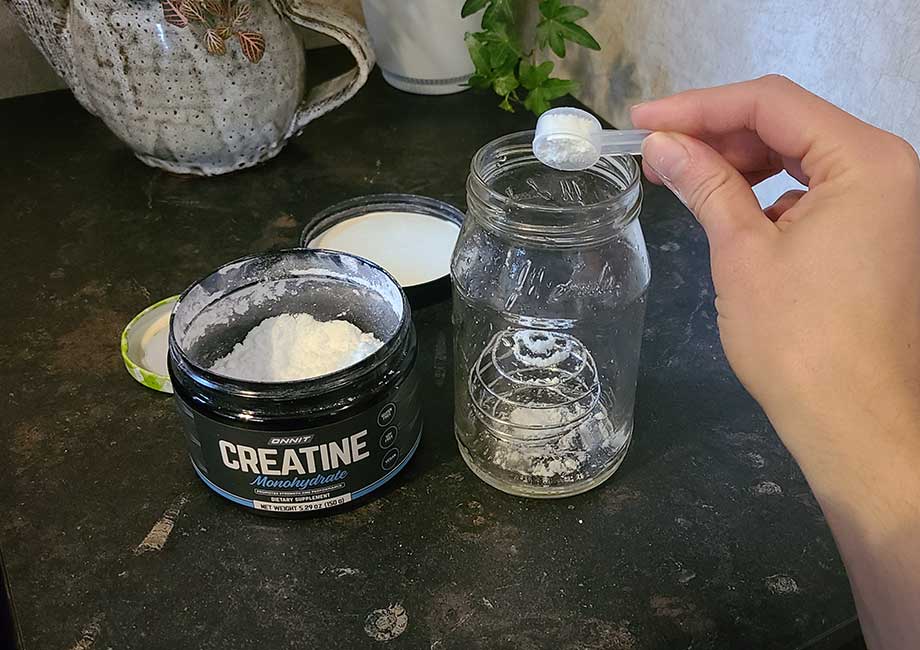
RELATED: What Is Creatine?
So, why don’t people just eat their creatine? Getting the same amount of creatine as one serving of creatine monohydrate powder (about 5 grams) would require you to consume about 4 to 5 pounds of meat per day, which isn’t exactly realistic. Thus, it is commonly consumed as a dietary supplement.
There is a compound called phosphocreatine that makes up most of the creatine stored in the muscles. It plays an essential role in the body’s production of adenosine triphosphate, or ATP, which is produced in the mitochondria of cells as the body’s source of energy. However, it is particularly useful to have available when your body is performing high-intensity exercise.
Now, we normally generate all of the ATP we need from food, at least enough to provide us with the energy to pull off basic functions like breathing and keeping our heart beating and activities of daily living like walking to the fridge or doing the dishes.
During resistance training, however, our muscles cannot contract as powerfully when our ATP begins to run out, resulting in failure and fatigue. Therefore, if you want to train harder and longer, making sure your muscles have enough creatine stores can be crucial.
Now for a quick chemistry lesson: A phosphate group is removed from ATP (adenosine triphosphate) and turns into ADP (adenosine diphosphate). Now, since ADP cannot be used for energy, it needs to get that phosphate group back to prevent muscle fatigue.
Supplementing with the right amount of creatine raises the levels of phosphocreatine in the muscles. If there is enough phosphocreatine, it can “donate” its phosphate molecule to ADP to make it ATP again. This is how creatine supplementation can provide enough energy1 needed to enhance exercise performance.
The effects of creatine supplementation go beyond just boosting energy levels. Creatine supplements also help to put on muscle mass, improve athletic performance, and help change body composition. We’ll talk more about this later.
A variety of types of creatine are now available, including creatine monohydrate, creatine phosphate, and creatine hydrochloride. This article will focus primarily on creatine monohydrate, since most studies showing the positive effects of creatine supplementation are shown after using monohydrate, which seems to be the most effective form of creatine.
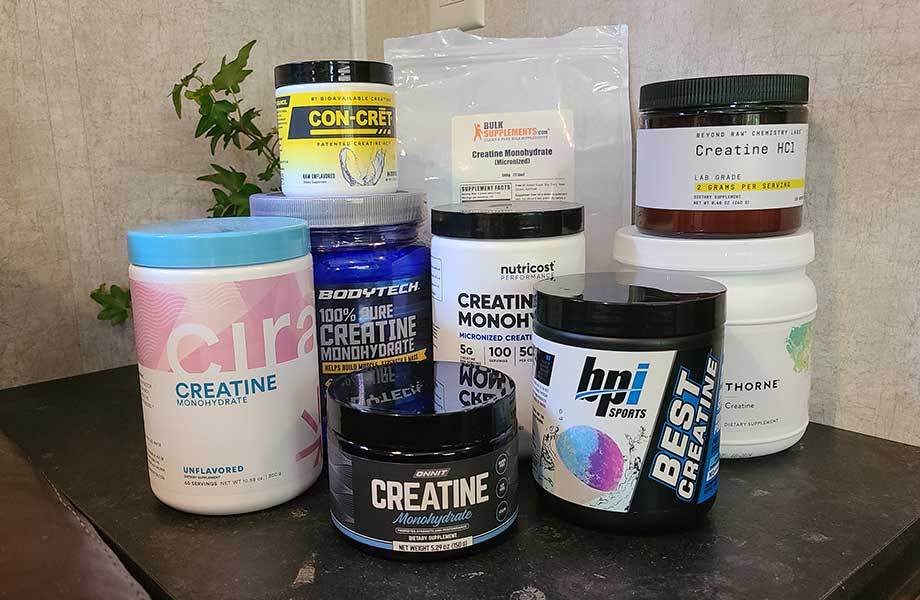
RELATED: Types of Creatine
Why Take Creatine?
As the most studied sports supplement out there, scientists have uncovered many reasons to take creatine. Though many purported benefits need more research, we’ll talk about the most established benefits here, according to science.
Helps Build Lean Mass
One of the main selling points of creatine supplements is the desire to gain muscle mass. There have been hundreds of studies that have consistently shown that creatine supports building muscle2 in conjunction with a consistent resistance exercise regimen.
RELATED: Does Creatine Make You Gain Weight?
In spite of this, the amount of muscle growth someone will experience varies widely according to a number of factors, including their genetic make-up, their current training regimen, their level of fitness, their diet, and their selected form of regular exercise.
Boosts ATP Production
As mentioned, creatine plays a big part in boosting ATP which, in turn, can boost exercise performance3. According to one recent study4, athletes who consumed creatine supplementation experienced an increase of 4-7% in peak power output and overall speed during sprinting, and other studies have found similar results.
Maintain Optimal Recovery from High-Intensity Exercise
Creatine’s ability to boost muscle recovery and reduce soreness is attributed to its ability to generate more energy for muscle cells. By allowing you to continue exercising even when your muscles are sore, you can maintain muscular strength and general exercise performance. Supplementing creatine can also reduce exercise-induced inflammation, which reduces the damage done to the muscles and can slow the rate of muscular catabolism1.
RELATED: Does Creatine Expire?
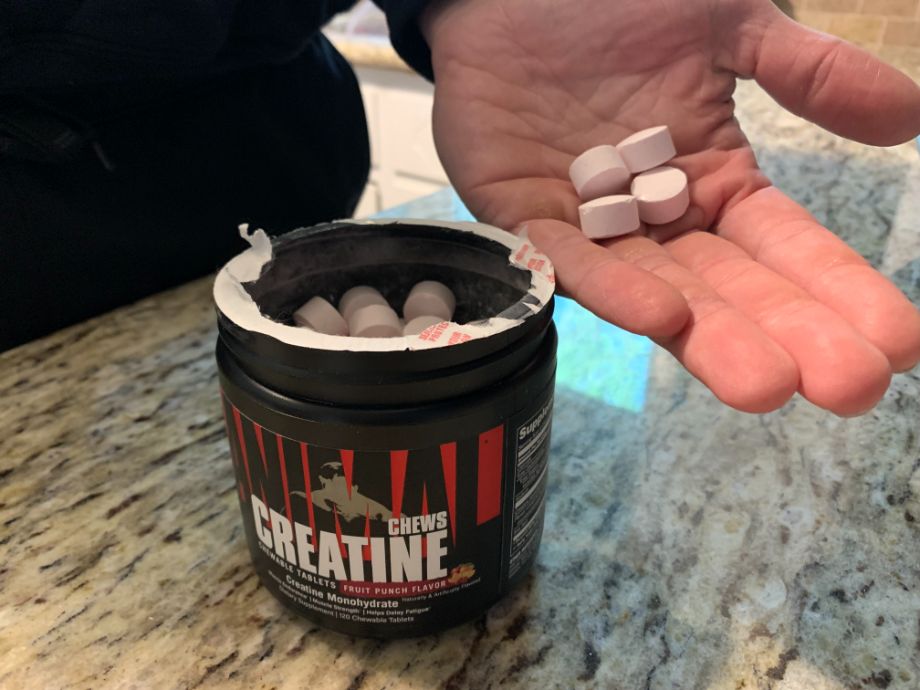
May Prevent Muscle Breakdown
Athletes recovering from injury can also benefit from creatine’s anti-inflammatory properties to reduce catabolism. This is why a sports nutritionist may recommend creatine to an athlete even if they aren’t lifting as immobility due to injury can lead to a rapid rate of muscle loss.
Creatine supplementation appears to have a positive effect on muscle loss and strength after an extended period of upper arm immobilization in otherwise healthy individuals, according to a 2022 review1.
Taking Creatine Before Your Workout
It was suggested in one 10-week study that taking the supplement close to exercise was superior to taking it long before or long after. There were two groups of participants. In one group, creatine was taken both pre-workout and post-workout, whereas in the other, creatine was taken in the mornings and evening.
It was shown that the group who took creatine close to exercise gained more muscle mass and strength than those who did not5. However, it was not shown that taking it before provided more benefits than taking it after and there has not been any science to definitively show that taking creatine pre-workout provides more benefits.
RELATED: When is the Best Time to Take Creatine?
Taking Creatine After Your Workout
During one month-long study, subjects did resistance training for five days a week with one group taking creatine before exercise and another group supplementing with it post-workout. The group that took creatine after exercise demonstrated greater gains in lean muscle mass and strength6.
Just to confuse you a little more, though, a longer, 12-week study, showed that there was no difference in body composition or performance benefits whether creatine was taken before or after exercise7. Other studies that have explored creatine supplementation timing have come up with this result as well. Overall, based on the limited research available, it’s not clear whether there are any reliable differences between taking creatine before or after exercise8.
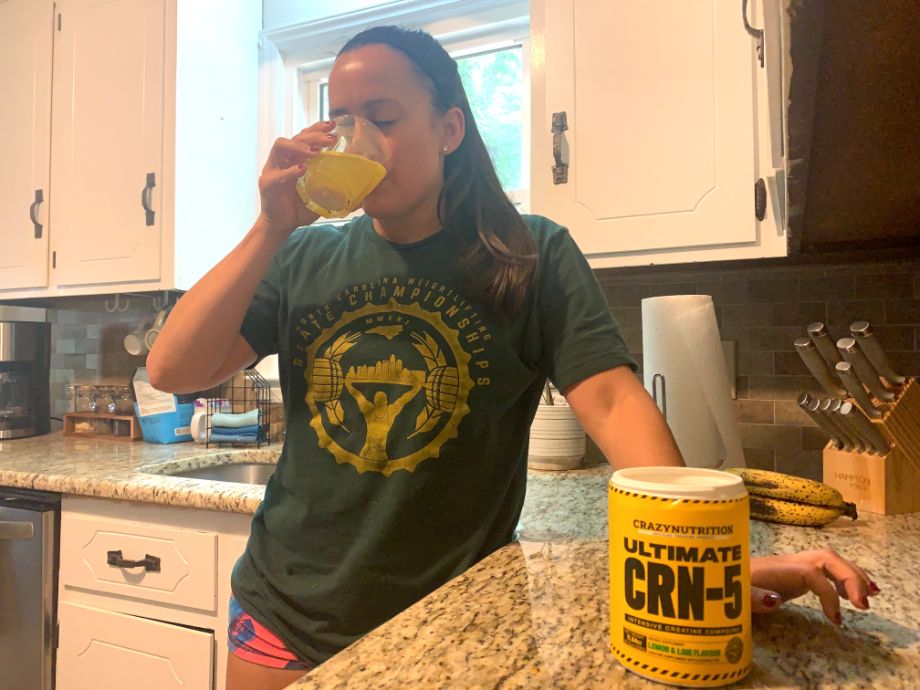
Taking Creatine on Rest Days
In order to get the most out of your training, it’s best to avoid skipping doses of creatine, even on rest days. Creatine taken on rest days may be referred to by a nutritionist or other fitness professional as a “maintenance dose,” as it is meant to help the muscles maintain their creatine levels, even on days you aren’t doing weightlifting.
RELATED: Should I Take Creatine on Rest Days?
Indeed, most of the research we have showing the benefits of creatine had the subjects supplement with the compound even on their rest days9 for consistency. You would want to take at least 5 grams of creatine as a maintenance dose to optimize creatine levels in the muscle cells.
Basically, even though you don’t have to supplement on rest days, it can provide you with the best results if you do. At the very least, you’re probably still sore on rest days and having muscle cells full of creatine may also help with muscle recovery and to mitigate that soreness. That way, when you go back to the gym, you can perform more efficiently which can indirectly help with building muscle and improving muscle strength.
Should You Take Anything Else with Creatine?
There is some science that shows that taking creatine with other synergistic compounds like carbohydrates may enhance the supplement’s benefits. An article published in the Journal of the International Society of Sports Nutrition10 suggests that taking creatine with a meal rich in carbohydrates can enhance creatine absorption in the skeletal muscle. It’s also helpful for replacing the glycogen you lost during training.
There is science to suggest that taking creatine with whey protein can be beneficial. The most obvious benefit to doing this is that protein shakes containing whey are also rich in the amino acid leucine. You’ve probably seen leucine in your supplement of BCAAs and that’s because it is a critical amino acid for stimulating muscle growth11.
So, taking both creatine and a protein shake post-workout will likely optimize gains in skeletal muscle. Also, in practical terms, it’s way easier to combine your supplements than taking them all separately, so blending creatine into your protein shake can save you some time, as well.
Another Journal of the International Society of Sports Nutrition study has shown that taking creatine along with dietary protein, not just the type you blend into your protein shake, can be helpful with recovery12. These effects were most profound in athletes that have suffered an injury. However, the results showing the effect in reducing muscle soreness markers in the subjects strongly suggests creatine intake along with protein foods can help with faster recovery than creatine alone.
In the spirit of that convenience we talked about earlier, many may prefer to approach their creatine timing by taking it pre-workout. For those who swear by taking a pre-workout supplement (or even BCAAs) before each exercise session, consider choosing a brand that also contains creatine.
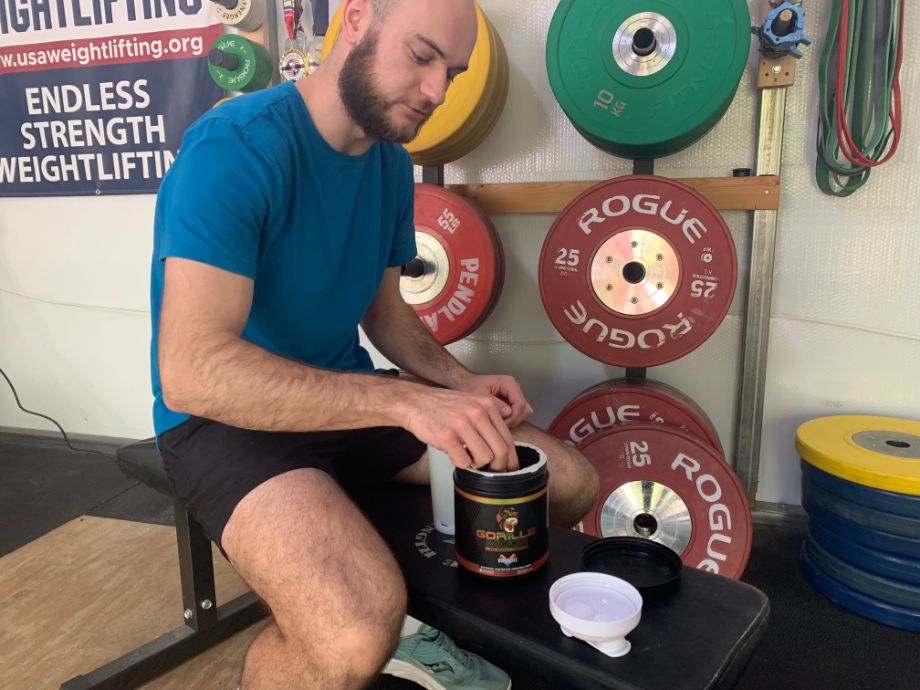
RELATED: Best Pre-Workout with Creatine
Just note that it does still need to contain 5 grams of creatine to be effective and you may still need a separate creatine supplement if you want to take it on rest days or are opting into doing a creatine loading phase. Talk to a sports dietitian nutritionist if you are concerned about banned substances or efficacy of certain supplements.
Do You Take Creatine Before or After Workout? Final Thoughts
According to the science we have available, creatine timing does not appear to make a significant difference in weight gain from lean body mass or athletic performance. In other words, take it whenever you feel like it! As long as it is in close proximity to your exercise. Now, this answer may be reassuring to some and frustrating for others, so if you want a little more guidance, focus on when you are most likely to take it consistently.
If you are more reliable when it comes to taking your pre-workout, schedule your creatine intake for before your exercise. If your post-workout protein shake is basically a ritual at this point, go with blending some unflavored creatine monohydrate powder into your whey.
Science has also shown us that taking your creatine with some carbs or other high-quality dietary protein can enhance creatine stores in the muscle cells. Furthermore, consuming some carbs post-workout also helps with replenishing glycogen stores, so it’s a good idea to do that anyway.
No matter when you choose to take creatine, remember that one of the common creatine side effects is bloating in the first few days. This is extremely common, as well as harmless, and the bloating will pass as your body becomes accustomed to the supplement. If you are doing a creatine loading phase, the bloating may last a bit longer. Just know that the sudden increase in body weight is not body fat, but water retention.
Do You Take Creatine Before or After Workout? FAQs
When should I take creatine for best results?
Science does not seem to support there being a specific time of day to supplement creatine that provides optimal benefits. However, most fitness enthusiasts find it most convenient to take creatine with other pre- or post-workout supplements.
How many scoops of creatine a day?
The average dose of creatine taken daily is 3-5 grams, which is the scientifically proven dosage to provide results. The optional phase of creatine loading, however, may require you to take several scoops each day, as a daily dose of 20 grams is typically required.
Can I put creatine in my protein shake?
Yes! Adding an unflavored creatine powder to your protein shake is a very efficient post-workout supplementation regimen.
How long will it take for creatine to start working?
The benefits of creatine supplementation and their timeline varies wildly and can depend on a variety of factors including your diet, your supplementation consistency, your current body composition, and more.
These statements have not been evaluated by the Food and Drug Administration. This product is not intended to diagnose, treat, cure, or prevent any diseases.
References
- Wu SH, Chen KL, Hsu C, et al. Creatine Supplementation for Muscle Growth: A Scoping Review of Randomized Clinical Trials from 2012 to 2021. Nutrients. 2022;14(6):1255. Published 2022 Mar 16. doi:10.3390/nu14061255
- Rawson, ES, Volek, JS. Effects of creatine supplementation and resistance training on muscle strength and weightlifting performance. J Strength Cond Res. 2003;17(4):822-831. doi:10.1519/1533-4287(2003)017<0822:eocsar>2.0.co;2
- Moraes Rd, Van Bavel D, Moraes BS, Tibiriçá E. Effects of dietary creatine supplementation on systemic microvascular density and reactivity in healthy young adults. Nutr J. 2014;13(1):115. Published 2014 Dec 15. doi:10.1186/1475-2891-13-115
- Bogdanis GC, Nevill ME, Aphamis G, et al. Effects of Oral Creatine Supplementation on Power Output during Repeated Treadmill Sprinting. Nutrients. 2022;14(6):1140. Published 2022 Mar 8. doi:10.3390/nu14061140
- Cribb PJ, Hayes A. Effects of supplement timing and resistance exercise on skeletal muscle hypertrophy. Med Sci Sports Exerc. 2006;38(11):1918-1925. doi:10.1249/01.mss.0000233790.08788.3e
- Antonio J, Ciccone V. The effects of pre versus post workout supplementation of creatine monohydrate on body composition and strength. J Int Soc Sports Nutr. 2013;10:36. Published 2013 Aug 6. doi:10.1186/1550-2783-10-36
- Candow DG, Zello GA, Ling B, et al. Comparison of creatine supplementation before versus after supervised resistance training in healthy older adults. Res Sports Med. 2014;22(1):61-74. doi:10.1080/15438627.2013.852088
- Ribeiro F, Longobardi I, Perim P, et al. Timing of Creatine Supplementation around Exercise: A Real Concern?. Nutrients. 2021;13(8):2844. Published 2021 Aug 19. doi:10.3390/nu13082844
- Naderi A, de Oliveira EP, Ziegenfuss TN, Willems MT. Timing, Optimal Dose and Intake Duration of Dietary Supplements with Evidence-Based Use in Sports Nutrition. J Exerc Nutrition Biochem. 2016;20(4):1-12. doi:10.20463/jenb.2016.0031
- Kreider RB, Kalman DS, Antonio J, et al. International Society of Sports Nutrition position stand: safety and efficacy of creatine supplementation in exercise, sport, and medicine. J Int Soc Sports Nutr. 2017;14:18. Published 2017 Jun 13. doi:10.1186/s12970-017-0173-z
- Breen L, Churchward-Venne TA. Leucine: a nutrient ‘trigger’ for muscle anabolism, but what more?. J Physiol. 2012;590(9):2065-2066. doi:10.1113/jphysiol.2012.230631
- Cooke MB, Rybalka E, Williams AD, Cribb PJ, Hayes A. Creatine supplementation enhances muscle force recovery after eccentrically-induced muscle damage in healthy individuals. J Int Soc Sports Nutr. 2009;6:13. Published 2009 Jun 2. doi:10.1186/1550-2783-6-13
Further reading

Check out what we thought about this affordable under-desk treadmill in our Sunny Health And Fitness Walkstation Slim Flat Treadmill review. Read more

Hemp protein powder benefits appeal to those who value a vegan, nutrient-rich, sustainable diet. Let’s delve into the RD-approved merits to see if it’s the right fit. Read more

Build the back of your dreams by learning how to perform the T-bar row, which mistakes to avoid, and why you should incorporate it in your program. Read more

The Rogue Mobility Wod Stick is a new mobility tool that is essentially a barbell in an easier to use size. Here's the details on the release. Read more

